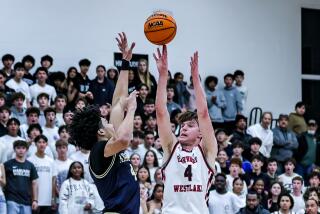Some Say Keeping Teammates Off the Same Teams During the Off-Season Slows Specialization; Others Don’t Want to Limit Athletes, So They’re Asking . . . : Is It Time to Rewrite the Rule Book? : PRO: : Rules Hard to Enforce but Needed
- Share via
Southern Section Rule 2712.1 needs a decimal point, which makes it seem like a restriction on mail box size or just another leash law. But it’s one of the rules that has sharply divided coaches and athletic directors in the Southern Section.
The rule limits the number of athletes from high school soccer teams who can play together on a club team out of season. The Southern Section Council will vote Thursday on whether to repeal not only the soccer rule, but those affecting basketball, softball, water polo, volleyball and baseball.
Those embracing the rules say that high school is a place for experimentation. And these rules discourage specialization and keep teams from practicing throughout the year.
Opponents say they limit an athlete’s choice, possibly even harming his future. Katella’s Tom Danley, one of Orange County’s most successful basketball coaches, says it’s simply a no-win situation.
“We’re damned if we do and damned if we don’t,” Danley said. “Either way we’re going to have a problem to deal with.”
And he’s right.
Many of those involved, though, say the rules’ advantages make them worth keeping.
Supporters say it discourages specialization in one sport, a growing--to some alarming--trend in high school athletics. What’s more, the rules decrease the number of athletes who might play together on a team all year.
“I’m for it,” says Capistrano Valley baseball Coach Bob Zamora, whose teams have won four of the last six South Coast League titles. “I think these kids get a little too burned out. Being around one sport for 12 months a year can give you cabin fever.”
Said Paul Orris, Corona Del Mar basketball coach: “If as a basketball player you can’t get something accomplished in spring practice and summer and fall preseason games, what else are you going to get accomplished? I think you’re running the risk of getting burned out.”
Other coaches say the rules decrease tensions between high school and club teams. Limiting the number of athletes who can compete on two teams decreases crises of loyalty between coaches, and problems of athletes switching between contrasting coaching philosophies. For instance, club coaches have also been accused of forbidding athletes to play in high school all-star games and attend academic field trips.
“If I were a soccer coach I would not let my kid play on an outside team,” said Dave Colville, Villa Park athletic director. “If they play for me, they play for me. I’m of the old school where I stand up and fight for what’s right. Maybe I’m a dinosaur, but a lot of people probably feel the same way I do but might not say it.”
The biggest criticism of the restriction is that it’s very difficult to enforce. Infractions are hard to document, let alone prove.
However, proponents say a rule isn’t bad simply because it’s difficult to enforce.
“You’ve got a good piece of legislation,” said James Douglas, Schurr principal. “Just because it’s difficult to enforce why do away with it?”
Said Bob Osbourne, Foothill athletic director: “We have a 55-m.p.h. speed limit too, right? My feeling is the rule’s in there for a reason so we follow them.”
Many coaches believe the responsibility should be theirs, not just their athletic directors’.
“As a head coach I know what my kids are doing and I wouldn’t let them do anything that’s not legal,” said Mater Dei’s Gary McKnight. “You have to police your own kids because if it comes back that one of my kids is ineligible, it’s my fault, not some club coach’s.”
Many smaller schools embrace the restrictions because they encourage athletes to play different sports, bolstering hard-to-fill rosters. Orris says declining enrollment at Corona Del Mar forces programs to share athletes. All five of his basketball starters played for other varsity teams.
Opponents of the Southern Section restrictions see its backers as idealists, whose ideas are full of textbook philosophy too mired in real-world problems to ever work. In fact, the entire issue can be reduced as a debate between what’s ideal and what will actually work. What’s more, opponents believe the restrictions will never hold up in court.
The backers, though, see themselves not as windmill fighters, but people trying to do a difficult job as best as humanly possible.
More to Read
Get our high school sports newsletter
Prep Rally is devoted to the SoCal high school sports experience, bringing you scores, stories and a behind-the-scenes look at what makes prep sports so popular.
You may occasionally receive promotional content from the Los Angeles Times.






